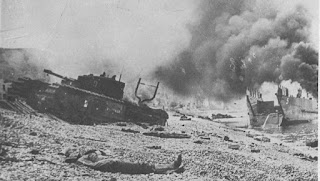Eighty years ago the British take an expensive lesson in how to conduct an assault landing
In a year of almost unrelieved military failures the British had been able to take comfort from a series of amphibious attacks on German-held France and the growing effectiveness of the bomber offensive against Germany. They now proceeded to over-reach themselves with their most ambitious amphibious raid by far. With the memory of Stalin's abuse to Churchill of British resolution in Moscow a recent memory, they finally mounted a much postponed brigade strength attack on the port of Dieppe devised by Combined Operations. It fell well short of the 'Second Front' desired by Stalin, but should have demonstrated that the British were capable of a major cross-Channel attack. Operation Jubilee was a dismal failure and achieved almost none of its objectives. A sea-wall familiar to generations of travellers, prevented British tanks from joining the battle in the town. The attackers lost more than half of the men landed, 3,500 as casualties and 2,000 as POWs. Part of the plan had been to provoke a major air battle but the RAF's losses were twice those of the Luftwaffe. The only consolation was that the British could claim some valuable lessons were learned for future landing operations.
An Imperial Japanese Navy task force was despatched to escort three troop carriers taking reinforcements to the troops on Guadalcanal which was becoming the scene of a ferocious battle to control its airstrip, called Henderson Field by the Americans. It encountered the main US carrier force which was also moving towards Guadalcanal. The action followed what had become the normal pattern for sea battles with the aircraft from the different carriers doing most of the fighting. Land-based aircraft from Henderson also inflicted severe damage on the troop carriers. The Battle of the Eastern Solomons was inconclusive but can be reckoned a strategic win for the Americans as the Japanese did not push onto to Guadalcanal. They also inflicted greater losses on the IJN, sinking a light carrier and, crucially, inflicting 61 aircrew losses compared to only seven suffered. Moreover, the USN could replace its losses easily whilst the IJN could not.
The brother of King George VI, the Duke of Kent, was killed in an accidental air crash in Scotland whilst he was on a visit of bases as part of his duties directing RAF welfare facilities. He had foregone his automatic rank as a Marshal of the Royal Air Force for a junior one, more appropriate for his work, although he had just been promoted to Air Commodore. As a young man his drug-taking and sexual adventures had been a source of deep concern to his family, but he become a positive exemplar, certainly compared to his eldest brother, now the Duke of Windsor.



Comments
Post a Comment